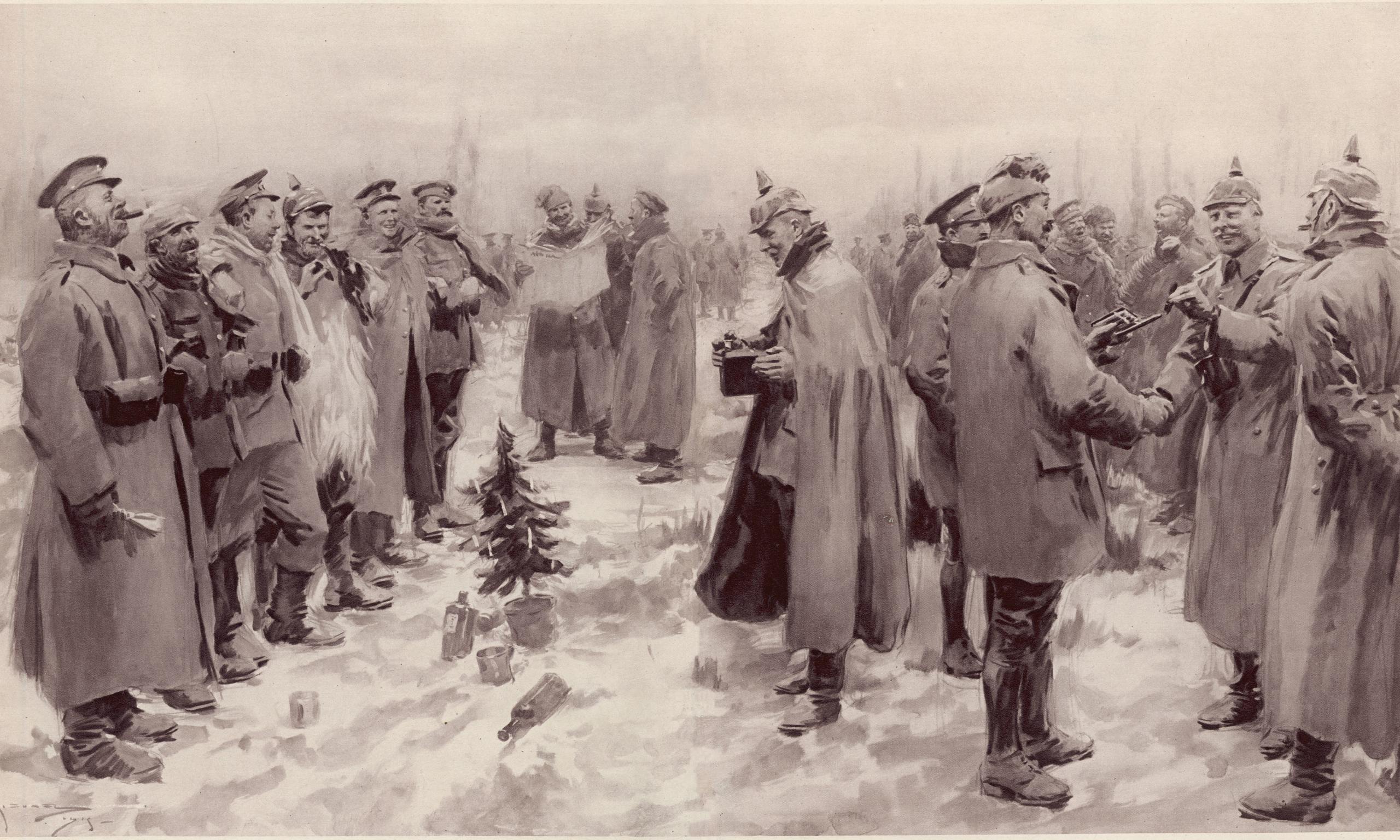The words of Chief of Staff Hulmuth von Moltke from 1914 rang in the Kaiser's ears, “Your Majesty, this war cannot be won.”
Wilhelm II had initially rejected the view of Moltke and fired him, but as 1915 dragged on, it became possible that the German fate was sealed. There were new developments such as air warfare and poison gas, leading to whole new aspects of battle. A further innovation was mass-propaganda, and the Kaiser decided this may be the method to come out ahead in an unwinnable war.
In 1914, the soldiers in the field began what was to be known as the Christmas Truce. On Christmas Eve, the German troops decorated their trenches and sang carols. The English troops, who recognized many of the tunes from their own carols, joined in singing. The artillery bombardments on both sides ended for the night, allowing soldiers to collect their dead, and joint services were held honoring the fallen on both sides. Once-enemies approached each other across the “No Man's Land”, exchanging gifts, sharing food, and engaging in games of football. Commanders on both ends reacted with disgust at the fraternization, but the unofficial truce lasted until after New Years' Eve in many places along the lines.
The cases of fraternization had continued despite the horrors of war by attrition. A German unit attempted a truce over Easter, but were warned away by their British opponents. Later that November, units from Saxony and Liverpool successfully fraternized. The soldiers in the trenches obviously did not care for the war; the Kaiser merely had to convince them to take a stand against it. While the Allied command issued orders against fraternization that upcoming Christmas, German orders encouraged the possibility and handed out gifts to exchange (including reasons for the war to be ended). Despite the orders, the soldiers in the trenches met and joined again in their small feasts and games of football. The Allied commanders erupted at the news and began court martial proceedings for hundreds, possibly thousands. Rebellion broke out among the ranks. Wilhelm was urged to attack while the Allies were weak, but he intended to win the war rather than a few battles before the Allies had propaganda material to regroup.
Seizing the diplomatic initiative and ensuring that word of the Christmas Truce spread past censorship, Wilhelm capitalized on the friendly spirits among the common soldiers. He demanded an armistice in the West, which the Allies agreed only along with an armistice in the East. Talks began, and the politicians finally conceded under pressure from the soldiers and their families. Lists of demands were drawn up, and, for each point, games of football and other athletic events would decide the victor. While troops remained in station during an armistice, Germany hosted the 1916 Olympics in Berlin that summer as it had planned to do before the war. Fighting for honor as well as diplomatic success, athletes built value with gold, silver, and bronze medals to be used in agreements during what would be a precursor to the League of Nations.
The notion was considered ludicrous by many, but war weariness kept naysayers from the majority opinion. Germany did not fair as well as the Allied nations, and most of the world expected the Kaiser to turn against his own idea and restart the war. To their surprise, he did not and ordered the removal of troops from France and Belgium as part of the agreement, though he kept Alsace-Lorraine. Reparations were traded, and war was formally outlawed in 1918.
Europe celebrated the War to End All Wars, though the name was hardly apt. Wars went underground, constantly fed by international espionage, support for uprisings (such as the Russian Civil War that would eventually stomp out notions of communism), and sabotage of other nations' teams. Tempers flared over each scandal, but war did not come back to the world stage until Ireland's fight for independence in 1928 was found to be supported overtly by the Germans. The Irish Revolt exploded outside of British borders with a Royal Navy blockade of Germany to cease supplies. The Germans countered with an invasion of Belgium to secure new ports, and Europe was swallowed up in the Second World War.
–
In reality, the Christmas Truces were suppressed. Following the 1914 truce, orders were followed for the most part opposing informal truces in 1915. A few examples were seen in 1916, but continual artillery fire ended most chances for fraternization. World War I would drag on until Armistice Day, November 11, 1918, after the deaths of some ten million and twenty million more wounded.

I was going to start out saying, "I wish this had actually happened" but then your scenerio ended up with a Second World War anyway :(
ReplyDeleteI was reminded of this by the recent Israeli soldiers dancing Gangnam Style with Palestinians issue, and decided to search for alternate history stories about when the Christmas Truce actually held and repeated and ended the Great War early.